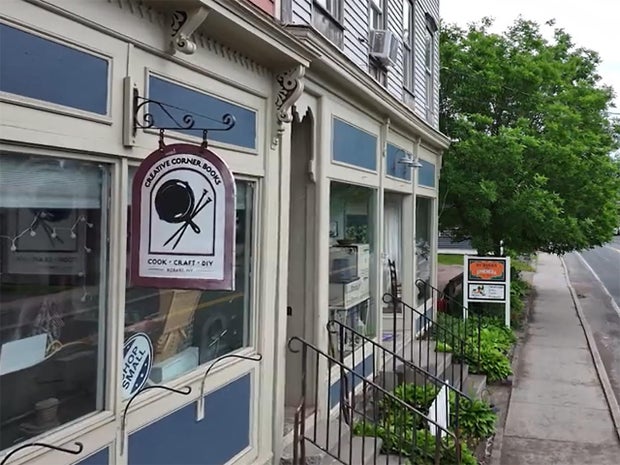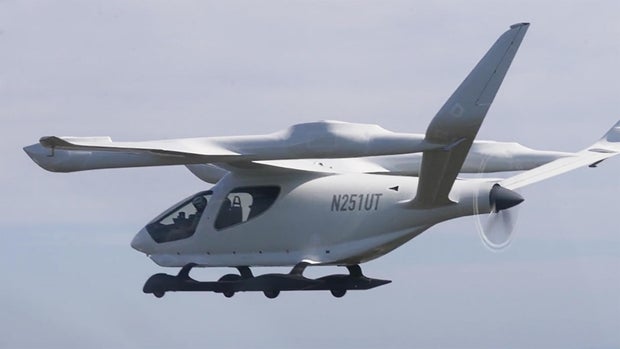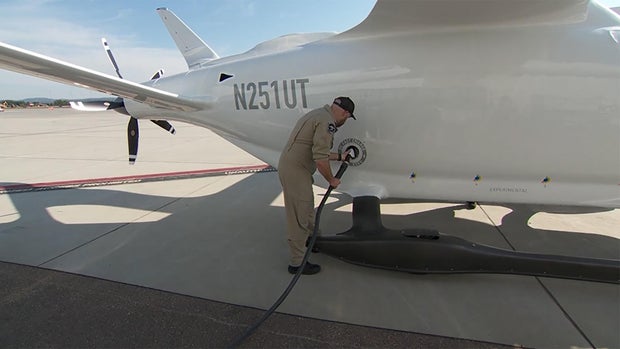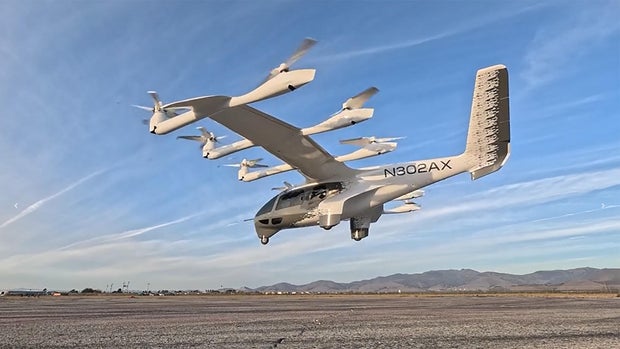CBS News
AT&T says customer data exposed in massive data breach

Watch CBS News
Be the first to know
Get browser notifications for breaking news, live events, and exclusive reporting.
CBS News
A New York village devoted to books

Watch CBS News
Be the first to know
Get browser notifications for breaking news, live events, and exclusive reporting.
CBS News
The tiny N.Y. town where bookstores rule

Nestled in the Northern Catskills, the tiny village of Hobart, New York, is home to around 400 residents, and millions of fascinating characters, all stacked high on shelves. Hobart is a book village. Within one brief block of Main Street, there are seven different bookstores.
When Kathy Duyer retired, she moved to Hobart to surround herself with beautiful scenery and plenty of books. She initially had no intention of selling them – she was buying them. “For about the first two years we were here, we were the best customers of the booksellers that they’d ever had,” she said.
But she and her husband eventually opened two small shops – one, Creative Corner Books, that sells cooking and crafting books; and another, New York Books and Ephemera, focused on all aspects of New York. “We really try not to overlap very much on what we carry so that there’s something different in every shop,” Duyer said.
CBS News
There’s a shop that specializes in mysteries (Quarry Books). Behind the children’s library (The Book Nook), another shop stocks niche travel books (More Good Books).
The village was inspired by Hay-on-Wye, a thriving Welsh book town that’s become a world-renowned destination for bibliophiles.
Don Dales has never been to Hay-on-Wye, and doesn’t even consider himself a “book guy.” But he does think of himself as an entrepreneur. Dales grew up near Hobart, which was once a key supply stop for the surrounding agricultural industry. When he moved back to the area two-and-a-half decades ago, times had changed. “This town was a ghost town,” he said. “I always say that tumbleweed was going down Main Street. It was depressing.”
Dales purchased several buildings on Main Street. Around that same time, a couple from Manhattan moved to town and opened the William H. Adams’ Antiquarian Bookstore. Dales thought there might be strength in numbers, so he started turning his buildings into more bookstores. “I went out and I bought a lot of books,” he said, “and a lot of lumber, and made a lot of bookshelves.”
CBS News
Old books gave Hobart a new identity – and new residents, like retired professors Barbara Balliet and Cheryl Clarke, the proprietors of Blenheim Hill Books. Clarke said, “I think Barbara had always fantasized about having a bookstore because of her love of books. I didn’t. I just wanted to retire!”
Clarke knows a thing or two about books – she’s published several collections of her poetry. She also knows a lot of writers, and co-founded the Hobart Festival of Women Writers, an annual weekend of female-focused readings and workshops.
Writers and readers now make pilgrimages to Hobart, in part for what the town represents. “They like to feel like they’re in a place where books matter,” said Balliet. “Because I think a lot of people are in places where books don’t matter. And so, when they come here, they’re just so happy!”
CBS News
You won’t find all the latest bestsellers in Hobart; almost everything here is secondhand. And nobody here is getting rich. For the shop owners, these stores are a labor of love – a new chapter in their lives.
Two dollars will get you a book and a cookie at young Mixali Asgarian’s table at the Hobart Farmers’ Market. Who knows? He may one day open the village’s eighth bookstore.
CBS News
Don Dales thinks there’s still room to grow: “People like a book. They like to see ’em on the shelves. They like to see the spine of the book and say, ‘Oh, I remember that book, that was a wonderful book!’ And besides, a home without books, that’s a boring home … unless it has a cat!”
For more info:
- Hobart Book Village
- William H. Adams’ Antiquarian Books, Hobart, N.Y.
- Blenheim Hill Books, Hobart, N.Y.
- The Book Nook (Children’s lending library), Hobart, N.Y.
- Creative Corner Books, Hobart, N.Y.
- Liberty Rock Books, Hobart, N.Y.
- More Good Books, Hobart, N.Y.
- New York Books & Ephemera, Hobart, N.Y. (Facebook)
- Quarry Books, Hobart, N.Y.
- Hobart Festival of Women Writers
- Hobart Farmers’ Market, Hobart, N.Y. (Facebook)
Story produced by Aidan Trevisan. Editor: David Bhagat.
CBS News
The electric-plane future is about to take off

For years, you’ve been able to watch cool-looking electric-plane videos on YouTube, created by some of the 300 companies who are working on them. But Beta Technologies, in Burlington, Vermont, is unique: “I believe we’re the only company flying people,” said Beta’s CEO and founder Kyle Clark. His company’s electric plane can carry six people, and flies 250 miles on one charge.
“Every year, batteries get better and better, about seven percent per year,” he said. “That means in seven years we’ll double that. And another seven years, we’ll double that again.”
He believes that, in the-not-distant future, we will be flying on electric-powered jetliners.
CBS News
Traditional airplanes pump out about a billion tons of carbon dioxide every year. Electric planes produce no emissions at all, and that’s only their first advantage.
“One of the things that I think is underappreciated in electric aviation is that it’s quiet,” said Clark. “You can actually hear the wind noise over the fuselage. You feel like a bird.”
Electric motors are much simpler than jet engines, too; they contain one-tenth as many parts. Furthermore, electric planes cost far less to fly, since electricity costs only one-fortieth as much as jet fuel.
CBS News
But maybe the most impressive advantage of electric planes is that not all of them require runways.
Planes are known as eVTOLs (a clumsy acronym for Electric Vertical Take-Off and Landing) don’t need a runway to lift off, but they can still fly forward the usual way. The eVTOLs designed by Archer Aviation, based in San Jose, California, have a series of propellers, some used only in the lifting portion of flight; other propellers tilt, to be used in both take-off and forward flight.
CBS News
Archer is creating “air taxis.” You’ll board the air taxi from a so-called “vertiport” downtown, and then fly to the airport, for example, in just a few minutes to catch your traditional flight. Adam Goldstein, the founder and CEO of Archer, says your eVTOL flight will cost about as much as an Uber or Lyft ride.
“There’s lots of traffic that will congest the roads in-between the city centers and those airports,” said Goldstein. “Manhattan to JFK is a great example, where it’s actually not that far on the ground, but takes a really long time using ground transportation.”
Well, this sounds great! Planes that are faster, safer, cheaper, more reliable, and better for the environment!
So, what’s the holdup? According to aerospace consultant Sergio Cecutta, it’s the Federal Aviation Administration. “You’re talking about a class of airplanes that did not exist,” he said. “The FAA has a very complex task. They make sure that we can walk onto one of the planes and be in no more danger than getting out bed.”
The need for FAA approval explains two strange aspects of Beta Technologies’ plane. First, it’s available with or without its vertical propellers. (Clark believes that it will be easier to get initial FAA approval for a traditional plane than one that takes off vertically.)
As for the second strange thing: Beta’s goal isn’t creating air taxis. “There are a lot of ways that we can make a meaningful dent on the emissions of aviation before we start to do the thing that everybody talks about, jumping over traffic,” said Clark. “Moving cargo, moving medical, all of those things happen first.”
Really? The world’s first electric planes will make history by carrying boxes?
For Cecutta, that makes perfect sense: “One of the goals from Amazon is to have the majority of their products to be available the same day in large metropolitan areas. What if I can actually take off and land from one warehouse to the other warehouse and move this cargo? I always think of the Beta airplane as the Amazon truck with wings.”
Today, every airline has a desperate pilot shortage. That’s one reason that most eVTOLs will eventually be self-flying. According to Cecutta, “In the 2030s, 2040s, there’s going to be a very good chance that you’re going to walk into an airplane where there’s no pilot.”
But in the near-term, the FAA will require a pilot.
Beta and Archer have received millions of dollars’ worth of orders from various airlines and military branches. Both of them, plus an air-taxi company called Joby, have already delivered some planes to the Air Force. All three companies expect to receive FAA approval, and begin flying in the U.S., next year.
On the day of “Sunday Morning”‘s visit, Beta Technologies unveiled its new factory, the first electric-plane plant outside of China. Among the dignitaries in attendance: Vermont Senator Bernie Sanders. “It is an extraordinary day, not just for Vermont or for the country, but I think for aviation and in taking on climate change as well,” he said.
Pogue asked Clark, “Why Vermont? It seems like all the engineers and the programmers are in Silicon Valley?”
“In Vermont, there’s a heavy awareness of climate change,” Clark replied. “And having a group of people working on this that not only are really good at what they do, but they care about the mission, gives them a little extra oomph at two in the morning when we’re trying to get ready for a flight test the next morning.”
Among those passionate Vermont employees: former Delta pilot Chris Caputo. He said he took “a pretty healthy pay cut” to come work for Beta. “But it’s more about the mission that this company is on to decarbonize aviation and do something good for our planet, our country and the world, and, you know, your kids, my kids, and the next generation.”
For more info:
Story produced by Sari Aviv. Editor: Ed Givnish.















